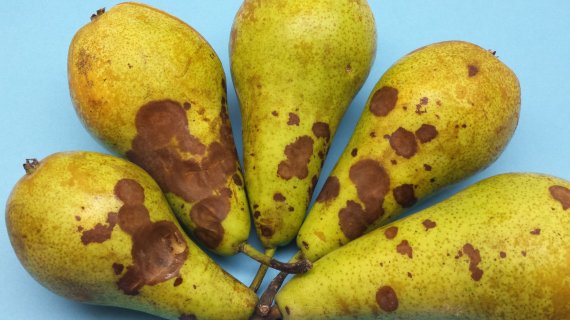Normally, fruit can be stored for 10 to 12 months in cold rooms when the conditions are optimized. However, in the past few years apples often started rotting after three to four months and pears after five to six months. The growers could not work out why.
Fungal diseases
Marcel Wenneker of the Field Crops business unit at Wageningen Plant Research in Randwijk took samples from infected apples and pears and discovered around 15 fungal diseases that were barely known in the Netherlands up to that point. Most were found only occasionally and affected 10 per cent of the fruit at most. But two fungi were running riot: Fibulorhizoctonia psychrophila among apples and Cadophora luteo-olivacea among pears. Wenneker: ‘These fungi are unique to the Netherlands. It could be that they thrive on the varieties of apples and pears that are grown in the Netherlands, but it could also be because they mainly appear when fruit is stored for a long period.’
The fungi infected the fruit during the growing season, but only caused visible symptoms of rotting months later.
Marcel Wenneker
Wenneker discovered that the fungi causing the storage diseases had an unusual characteristic. The fungi infected the fruit during the growing season, then went dormant and only caused visible symptoms of rotting months later. ‘That means spraying fungicide just before harvesting is pointless; the fungi will already have infected the fruit.’
The applied researcher is now investigating how the fungi manage to survive in orchards. ‘It looks as if they colonize various substrates, such as leaf and weed waste matter, and produce spores in the fruit-growing season that infect the fruit.’ It would seem sensible to remove the plant remnants, according to Wenneker, but that is still a guess at present. ‘I’ll probably be able to give specific recommendations in two years’ time.’
Wenneker wants to move towards environmentally friendly control of the fungi but that is not easy. ‘The Netherlands is so wet that it’s a real breeding ground for fungi.’ He advocates a systemic approach based on sound understanding of how the pathogens spread in the orchard, the fruits’ defence mechanisms and the interaction between the fruit trees and the fungi.
Marcel Wenneker promoted february 25 2019 at Bart Thomma, professor Fytopathology.

 Photo: Marcel Wenneker
Photo: Marcel Wenneker